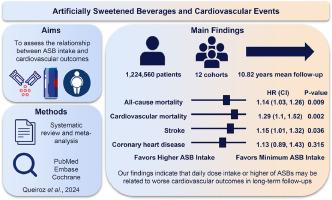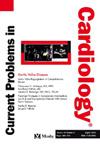大量饮用人工甜味饮料与心血管事件的相关风险:系统回顾和荟萃分析。
IF 3
3区 医学
Q2 CARDIAC & CARDIOVASCULAR SYSTEMS
引用次数: 0
摘要
背景:随着越来越多地使用人工甜味剂作为糖的替代品,人们开始关注它们对心血管健康的影响。人工甜味饮料是膳食甜味剂的主要来源,但尽管获得了国家食品机构的批准,有关其与心血管事件的关系的证据却并不确凿。我们的 "元分析 "评估了人工增甜饮料消费与长期随访队列中心血管事件的长期结果之间的关系:我们在 Medline、Embase 和 Cochrane 数据库中系统检索了队列研究,这些研究调查了大量饮用人工增甜饮料的人群与极少饮用或不饮用人工增甜饮料的人群之间的全因死亡率、心血管死亡率、中风和冠心病发病率。我们使用 R 软件中的随机效应模型计算了汇总事件危险比和 95% 的置信区间,并通过 I² 统计量评估了异质性:我们纳入了 12 个前瞻性队列,包括 1,224,560 名患者。对患者分组进行了分析,并根据饮食因素和合并症等共同因素对数据进行了调整。每日饮用一种或多种人工甜味饮料与较高的全因死亡风险(HR 1.14;95% 1.03 至 1.26;p < 0.01;)、心血管死亡风险(HR 1.29;95% 1.1 至 1.53;p < 0.01;)和中风风险(HR 1.15;95% 1.01 至 1.32;p = 0.04;)显著相关:在这项荟萃分析中,我们发现大量食用 ASB 与急性心肌梗死、心血管疾病和中风发病率增加之间存在显著关联,这凸显了对心血管疾病的潜在长期影响。本文章由计算机程序翻译,如有差异,请以英文原文为准。

High consumption of artificially sweetened beverages and associated risk of cardiovascular events: A systematic review and meta-analysis
Background
With the rising use of artificial sweeteners as sugar substitutes, concerns regarding their impact on cardiovascular health have emerged. Artificially sweetened beverages are the primary source of diet sweeteners, but despite approval by national food agencies, evidence of their association with cardiovascular events has not been conclusive. Our Meta-Analysis assessed the relationship between artificially sweetened beverage consumption and long-term outcomes of cardiovascular events in extended follow-up cohorts.
Methods
Medline, Embase, and Cochrane databases were systematically searched for cohort studies investigating the incidence of all-cause mortality, cardiovascular mortality, stroke, and coronary heart disease among individuals with high consumption of ASB compared to minimal or no consumption. Pooled event hazard ratios with 95% confidence intervals were calculated using a random-effects model in R software, with heterogeneity assessed via I² statistics.
Results
We included twelve prospective cohorts comprising 1,224,560 patients. Analyses were conducted on patient groups with data adjusted for co-founding, such as dietary factors and comorbidities. One or more daily dose of Artificially sweetened beverages was significantly associated with a higher risk of all-cause mortality (HR 1.14; 95% 1.03 to 1.26; p < 0.01;), Cardiovascular mortality (HR 1.29; 95% 1.1 to 1.53; p < 0.01), and stroke (HR 1.15; 95% 1.01 to 1.32; p = 0.04;).
Conclusion
In this meta-analysis, we found a significant association between high consumption of ASBs and increased incidence of ACM, CVD, and stroke, highlighting potential long-term cardiovascular implications.
求助全文
通过发布文献求助,成功后即可免费获取论文全文。
去求助
来源期刊

Current Problems in Cardiology
医学-心血管系统
CiteScore
4.80
自引率
2.40%
发文量
392
审稿时长
6 days
期刊介绍:
Under the editorial leadership of noted cardiologist Dr. Hector O. Ventura, Current Problems in Cardiology provides focused, comprehensive coverage of important clinical topics in cardiology. Each monthly issues, addresses a selected clinical problem or condition, including pathophysiology, invasive and noninvasive diagnosis, drug therapy, surgical management, and rehabilitation; or explores the clinical applications of a diagnostic modality or a particular category of drugs. Critical commentary from the distinguished editorial board accompanies each monograph, providing readers with additional insights. An extensive bibliography in each issue saves hours of library research.
 求助内容:
求助内容: 应助结果提醒方式:
应助结果提醒方式:


